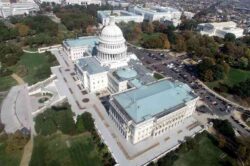Judge orders unsealing of redacted affidavit in Trump search

An aerial view of President Donald Trump’s Mar-a-Lago estate Aug. 10, 2022, in Palm Beach, Fla.
11:13 JST, August 26, 2022
WASHINGTON (AP) — A judge ordered the Justice Department on Thursday to make public a redacted version of the affidavit it relied on when federal agents searched the Florida estate of former President Donald Trump to look for classified documents.
The directive from U.S. Magistrate Judge Bruce Reinhart came hours after federal law enforcement officials submitted under seal the portions of the affidavit that they want to keep secret as their investigation moves forward. The judge set a deadline of noon Friday for a redacted, or blacked-out, version of the document.
The order means the public could soon learn at least some additional details about what led FBI officials to search Mar-a-Lago on Aug. 8 as part of an ongoing criminal investigation. Documents already made public show the FBI retrieved from the property 11 sets of classified documents, including information marked at the top secret level.
Search warrant affidavits typically contain vital information about an investigation, with agents spelling out to a judge the justification for why they want to search a particular property and why they believe they’re likely to find evidence of a potential crime there. But affidavits routinely remain sealed during the course of pending investigations, making the judge’s decision to reveal portions of it in this investigation all the more striking.
The redactions proposed by the Justice Department are likely to be extensive given the sensitivity of the investigation, lessening the likelihood that the document will offer a comprehensive look at the basis for the unprecedented search or significant insights about the direction of the probe. Yet even a redacted affidavit can contain at least some fresh revelations about the investigation, which brings fresh legal peril just as Trump lays the groundwork for another presidential run in 2024.
Federal agents are investigating potential violations of three different federal laws, including one that governs gathering, transmitting or losing defense information under the Espionage Act, according to documents already made public. The other statutes address the concealment, mutilation or removal of records and the destruction, alteration or falsification of records in federal investigations.
The Justice Department had earlier contested arguments by media organizations to make any portion of the affidavit public, saying the disclosure could contain private information about witnesses and about investigative tactics. But Reinhart, acknowledging the extraordinary public interest in the investigation, said last week that he was disinclined to keep the entire document sealed and told federal officials to submit to him in private the redactions it wanted to make.
In his order Thursday, Reinhart said the department had made compelling arguments to leave sealed broad swaths of the document that, if disclosed, would reveal grand jury information; the identities of witnesses and “uncharged parties”; and details about the investigation’s “strategy, direction, scope, sources and methods.”
But he also said he was satisfied “that the Government has met its burden of showing that its proposed redactions are narrowly tailored to serve the Government’s legitimate interest in the integrity of the ongoing investigation and are the least onerous alternative to sealing the entire Affidavit.”
Multiple news media organizations, including The Associated Press, argued in court for the disclosure of the affidavit, citing the extraordinary public interest in the federal search of a former president’s home.
After the Justice Department submitted its filing under seal on Thursday, the media coalition responded by asking the judge to unseal portions of the department’s brief and to direct the government, “going forward,” to file publicly a redacted version of sealed documents it submits. The groups noted that significant information about the investigation is already public.
“At a minimum, any portions of the Brief that recite those facts about the investigation, without revealing additional ones not yet publicly available — in addition to any other portions that pose no threat to the investigation — should be unsealed,” the news organizations wrote.
They added, “If and when additional facts come to light and are confirmed to be accurate, or certain facts no longer pose a threat to the investigation for any other reason, there is no justification for maintaining them under seal either.”







